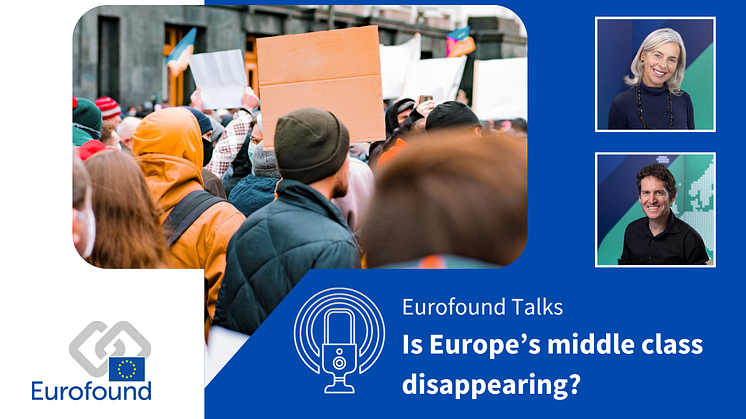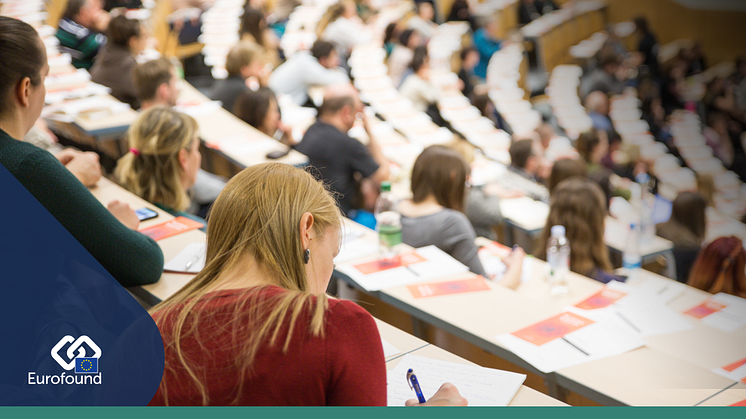Two-thirds of unemployed people in the EU do not receive benefits
Around two-thirds of unemployed people in the EU do not receive benefits, often because their employment records are shorter than required, or their benefits have run out.

Around two-thirds of unemployed people in the EU do not receive benefits, often because their employment records are shorter than required, or their benefits have run out.

Workplace cyberbullying or ‘digital harassment’ is only explicitly covered in regulatory frameworks in Denmark in the EU, with other Member States either attempting to extend legal definitions to include misconduct occurring through information and communication technologies (ICTs) or outside of the physical workplace; or lacking any definition of workplace bullying or harassment in law.

In a new episode of Eurofound Talks Mary McCaughey speaks with Eurofound Research Manager Carlos Vacas about the situation of the middle class in Europe. Together, they explore a more nuanced picture to the one that is commonly expressed; different patterns are emerging across European regions, for instance between the Member States that joined the EU after 2004 and older Member States.

Human capital - defined as the knowledge, skills and other attributes that enable people to be productive - played a role in EU convergence in respect of national income over 2014–2021. Specifically, highly educated individuals have helped central and eastern EU Member States and regions to catch up with their western counterparts in terms of gross domestic product (GDP) per capita.

Job retention schemes, one of the main policy tools used during the COVID-19 pandemic to safeguard jobs and protect incomes, saved 26.9 million jobs in the EU in 2020 and 2021.The schemes also reduced inequality by 0.15 percentage points, and lowered the at-risk-of-poverty rate by 0.5 percentage points.

Urban and capital areas have disproportionately benefitted from the digital revolution in Europe, with a high rate of knowledge and service-based jobs. By comparison, many rural areas risk being left behind, with unbalanced urban economic dominance further deepening urban-rural divides.

The lack of a single agreed definition of ‘just transition’ by the different interest groups participating in the EU Territorial Just Transition Plans (TJTPs) is hampering stakeholder involvement and progress on the issue.

Prolonged labour shortages in the EU affect growth, innovation and the bloc’s ability to achieve its digital and green targets, as around 80% of EU employers struggle to recruit workers with the right skills. Currently, the skills of one in three employees in the EU are mismatched with their job, with 17% overqualified and 13% underqualified.

National minimum wage rates were substantially raised in almost all EU countries in 2024, reversing the loss of purchasing power that minimum wage workers experienced between 2021 and 2023, according to relevant calculations.

In a new episode of Eurofound Talks Mary McCaughey speaks with Eurofound researchers Eszter Sandor and Massimiliano Mascherini about the situation for young people in Europe, from the impacts of the economic crisis and Great Recession to the aftermath COVID-19 pandemic and voting trends in the recent European Parliament elections.

Eurofound's new report explores young people’s wishes and plans for the future in the context of the current labour market and housing situation. It finds that, while there are positive signs for young people in terms of employment, many young people in Europe find themselves locked out of the housing market and unable to establish the independence required to have families of their own.

In a special edition of Eurofound Talks, Mary McCaughey is joined by Eurofound Executive Director Ivailo Kalfin and Ivan Krastev, Chairman of the Centre for Liberal Strategies and permanent fellow at the Institute for Human Sciences in Vienna, to look at the political, social and economic drivers in Europe and how they might influence voters at the ballot box in June.
